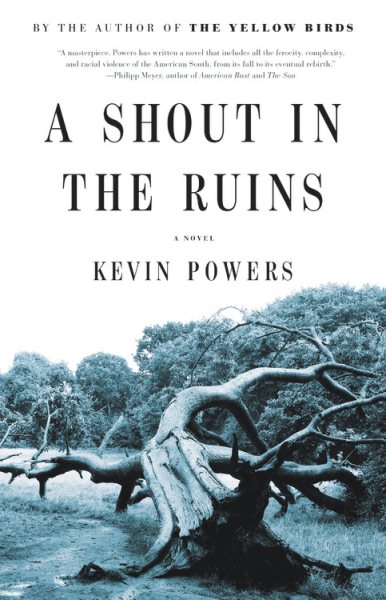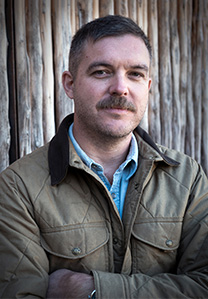Interview by Jana Hoops. Special to the Clarion-Ledger Sunday print edition (May 20)
In his newest work, A Shout in the Ruins, award-winning writer Kevin Powers presents a powerful story of the brutal realities of violence and oppression in the American South during and long after the Civil War period.
 Set in Powers’ hometown of Richmond, Virginia, the stories that make up A Shout in the Ruins stretch across nearly a century, from antebellum years to the 1980s. The plot during Civil War times unfolds for the partners of an ill-fated marriage between a plantation owner and the young daughter of a wounded veteran; as well as two young lovers enslaved on the plantation.
Set in Powers’ hometown of Richmond, Virginia, the stories that make up A Shout in the Ruins stretch across nearly a century, from antebellum years to the 1980s. The plot during Civil War times unfolds for the partners of an ill-fated marriage between a plantation owner and the young daughter of a wounded veteran; as well as two young lovers enslaved on the plantation.
In a separate theme that runs alongside these characters is the story of George Seldom, a man in his 90s who was left orphaned by the war, and, in the 1950s, is looking back on his childhood. The strain of the destruction of his neighborhood brought on by the building of an interstate highway through Richmond prompts him to travel south in hopes of capturing glimpses of his origins.
In his search he meets Lottie, who helps him locate the house in which he grew up. The journey ultimately brings him to consider both the changes and the constancies of his long lifetime; and Lottie later reflects on her own middle age during the 1980s.
Powers’ first novel, The Yellow Birds (2012), was a National Book Award Finalist that captured both the PEN/Highway Award and the Guardian First Book Award. His first collection of poetry, Letter Composed During a Lull in the Fighting, was published in 2014.

Kevin Powers
With a bachelor’s degree from the Virginia Commonwealth University and an MFA from the University of Texas at Austin, Powers is a U.S. Army veteran who served in Iraq in 2004 and 2005.
Today, Powers lives in Austin, and admits that, on the home front, he is “an avid but mostly unsuccessful gardener. There is a pathetic-looking, but still living, gardenia in a pot on my front porch that is a testament to this fact,” he said. “I also try to spend as much time outdoors as I can. Las tyear, I bought a little 250cc Honda dirt-bike that I take up to the mountains in Colorado whenever I’m able.”
You obviously did a lot of research for A Shout in the Ruins about life in and around Richmond after the Civil War. Some of the scenes are gut-wrenching. Was there any one thing that you learned in your research that surprised you? And was anything about this book that was (as in your former book) that was inspired by your own experience of war?
Growing up in Richmond, one learns a lot about all the history that has happened in and around the city, but it was different returning to that history as an adult, having the experiences I’ve had in life, and now with children of my own that I’ll someday need to explain that difficult history to.
I suppose I knew this intellectually, but in researching the period it was shocking to recognize how the institution of slavery permeated every aspect of life, and moreover, that it could be treated so casually by those who perpetrated and depended on its existence. And so, you come to see how strategic the thinking was that allowed the standing order to remain unchanged after the war, even though it temporarily no longer had the force of law behind it.
An example of a particularly shocking moment was reading the obituary of Robert Lumpkin, whose slave jail is featured in the novel and who died in 1866. It read, “He was born and raised in this city, was 61 years of age, and was an honest man.” It’s hard to imagine a more fitting representation of the banality of evil.
I assume the title of A Shout in the Ruins comes from chapter 10, when George and Lottie visit the cabin he was born in. Explain how the title of the book fits with that scene.
Yes, and it’s a reference to all the ruins in the book. Certainly, the cabin George and Lottie visit, but also the ruined plantation house at Beauvais, and specifically that shout when Emily is discovered hiding nearby. But in a larger sense, I hoped the title would be evocative of the urgency with which I feel it is necessary to truly and honestly reckon with our shared past. The title is also a reference to a poem I love by Louis Aragon, called “Poem to Shout in the Ruins,” which while not related to the book thematically, embodies just that kind of urgency.
I loved how you wove time and place around the character of George, who came off as the light in the story’s darkness. Who or what was your inspiration for the idea of this character?
Thank you. I must admit I didn’t begin with him in mind. He emerged through the telling of the story, and the more it developed, it became clear to me that part of the process was looking for a character who could embody Virginia in all its true complexities. In my mind, George is the quintessential Virginian, to the point where I almost titled the book “The Virginian” after him. But then I realized there were already a dozen or more books, films, and TV shows bearing that title, so I went with the one it has now.
Lottie was a very pivotal character in regard to George’s attempt at making sense of his life. After George’s death, you continued to develop her character well into the 1980s. Tell me about that.
I felt it was essential to connect this history to the present, or at the very least to a world that was recognizable to me. I wanted to make sure I wasn’t treating the past as something quarantined, something disconnected from life in contemporary America.
Lottie allowed me to do that, but also having attempted to face and address the past as honestly as I could, I wanted to see what remained. What hope could there be for us, what love, what compassion? Would it be naive to think that these aspects of life were truly possible given the burdens of history that we carry into the present moment? I could see how a reader might conclude her story is tangential, but for me she is thematically fundamental to the book.
Her brief time with Billy allowed me to ask all those questions with a new perspective. I don’t presume to have the answers to our country’s awful legacy of suffering and violence, but it does seem to me that a new level of honesty will be a prerequisite to finding them. that level of honesty is present in the relationship between Lottie and Billy, and aspirational for me as an ordinary man in the world. I genuinely feel like an optimist at heart and telling Lottie’s story allowed me to put that optimism to the test.
The book ends in 1906 with George and Emily meeting by happenstance on a park bench, but not knowing one another. Emily was talking to herself out loud about love being “the only miracle.” Explain why you chose to end the book this way.
I wanted to leave the reader with a question. So, having read everything that comes before that encounter, I hope readers will ask themselves if she’s telling the truth.
I noticed a lot of references to the color yellow in this book. Does it have anything to do with your first novel The Yellow Birds?
It may just be a tic! I’m not sure. In The Yellow Birds, I wanted that connotation of cowardice to be present, but I didn’t realize it had bled into the new book. I’ll have to think more about that.
According to some reviews of your work that I’ve read, your writing compares to that of Faulkner. What do you say?
It’s certainly not a claim I would be prepared to make about my own work, but I am flattered that others have made it. For many writers from the South, his books are touchstones, and that is definitely true for me.
Can you share any ideas you may be exploring for an upcoming work?
Nothing has cohered yet, but my recent reading has tended toward the spiritual: Merton’s The Seven Storey Mountain, C.S. Lewis, and others.
My own spiritual life is characterized primarily by doubt and confusion, but whenever I’ve had those feelings about a subject in the past, I’ve tended to write about it, to see if there’s a way that I can crack the code or at the very least throw words at the mystery in a way that might be interesting to myself and others. So, I’ll either do that or write a love story. I can’t say for sure at the moment.
Kevin Powers will be at Lemuria tomorrow, May 22, at 5:00 to sign and read from A Shout in the Ruins. A Shout in the Ruins has been selected our May 2018 selection for Lemuria’s First Editions Club for Fiction.


Comments are closed.